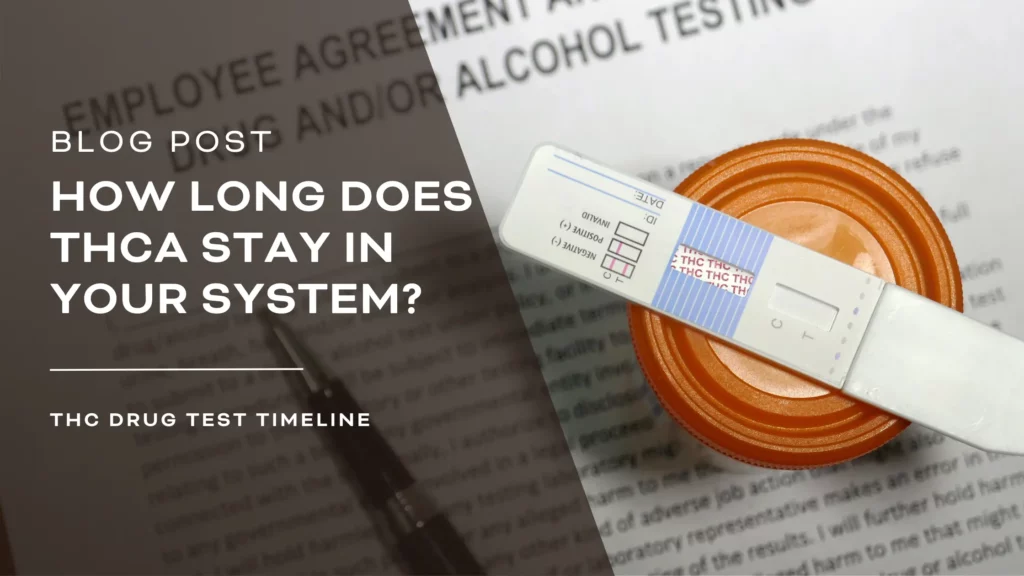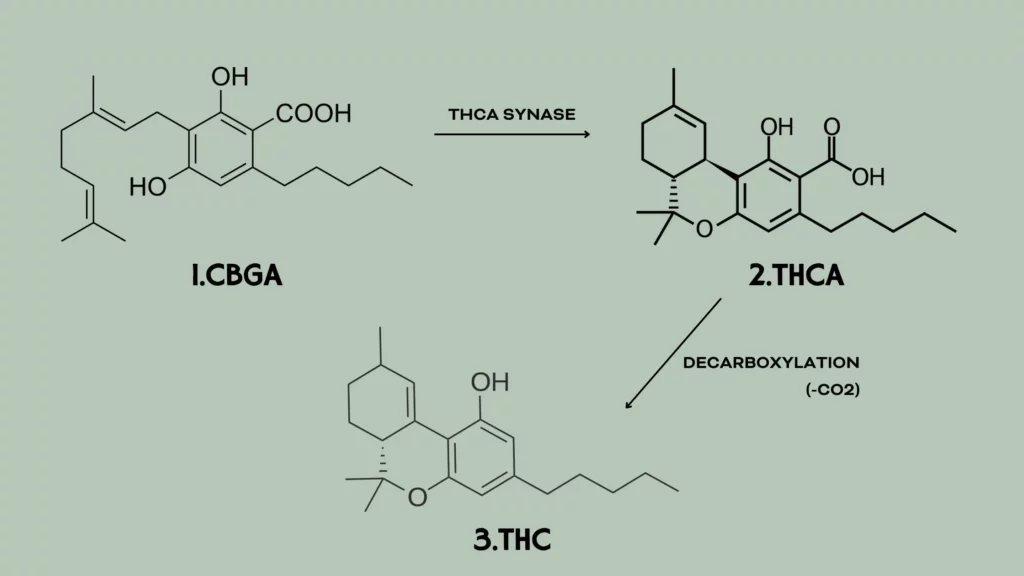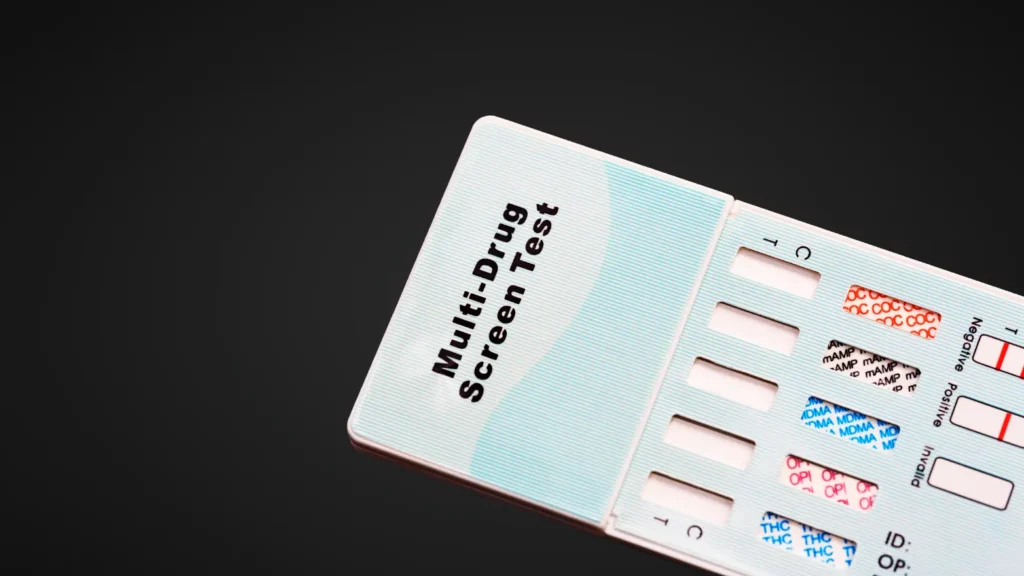How Long Does THCA Stay In Your System? – Drug Test Timeline

Table of Contents
How long THCA stays in your system will depend on a few key factors, including your individual body chemistry, how much you’ve consumed and how often, as well as whether you’ve activated the THCA with heat (decarboxylation) to transform it into THC, and of course, the type of drug test used to detect the cannabinoid metabolites.
If you’re like us, then you’re probably as excited about the popularity of THCA, or tetrahydrocannabinol acid products, to have hit the thriving legal hemp market as the compound holds immense fascination.
THCA’s unique properties allow for consumption in its raw form, preserving its integrity as a THCA cannabinoid or the option to transform it into THC, offering many a potential legal pathway to experience the psychoactive effects of cannabis.
This article will cover how cannabinoids are absorbed, metabolized, and detected in most drug tests. We’ll also compare long-term cannabis use with short-term and how this can affect the amount of time THCA and other cannabinoids remain in your body fat, even after the potential benefits have worn off.
Key Takeaway – THCA & Cannabis Detection
- THCA can be detected in urine drug tests for approximately 1-2 days after use.
- The detection window may be longer for regular users compared to occasional users.
- Just as there are factors that affect how long weed is detected in your system, factors such as dosage, consumption method, metabolism, and overall health can affect the length of time THCA remains detectable.
- Standard drug tests primarily target THC and its metabolites, not THCA specifically, but false-positive results for THCA are uncommon.
- Once you heat the THCA cannabinoid (smoking, vaping, or cooking), you are transforming the compound into THC, and this type of cannabis consumption will lead to a positive drug test.

Understanding THCA and THC Differences
When it comes to consuming THCA, you have two primary options:
- Consuming THCA products in their raw form: As long as the cannabinoid has not been exposed to heat and undergone decarboxylation, the THCA remains non-psychoactive and will not produce intoxicating effects. Raw THCA can be found in fresh cannabis flowers and products like tinctures or THCA gummies made from unheated hemp buds.
- Subjecting THCA to heat to transform it into the psychoactive THC: The other option is to apply heat to the cannabis product to temperatures between 200°–250°F (93-121°C). Heat causes THCA to lose a carboxyl group and transforms it into THC, which is the primary psychoactive cannabinoid.
These two consumption methods create very distinct experiences with cannabis and may also affect how the cannabinoids are absorbed and metabolized in the body, influencing its detection on drug tests.
Will THCA Show Up On A Drug Test?
It depends on the type of drug test used, but typically, raw cannabis consumption like THCA isn’t something that’s tested for because it’s not illegal or psychoactive.
However, the moment you expose your THCA to heat, it transforms into THC.
At this point, it doesn’t matter whether or not your THCA came from a legal hemp source, the body will break down the THC into THC metabolites (THC-COOH) which will trigger a positive THC test.
In rare circumstances, some drug tests may potentially cross-react, creating false positive test results as cannabinoid metabolites may look very similar.
Absorption & Metabolism Of THCA In The Body
There are three primary routes of absorption for cannabinoids:
- Oral ingestion: When THCA is consumed orally as raw cannabis juice, THCA gummies, or other edibles. In this form of ingestion, THCA passes through the stomach and intestines, where it’s broken down by digestive enzymes before it’s absorbed into the bloodstream through the intestinal walls, eventually reaching various tissues and organs to exert its potential effects.
- Sublingual absorption: This typically involves placing THCA tinctures or oils under the tongue where the sublingual mucosa, consisting of thin tissues and abundant blood vessels, allows for the direct absorption of THCA into the bloodstream. This bypasses the digestive system, leading to a faster onset of effects and a higher concentration of THCA delivered compared to oral ingestion.
- Inhalation: Inhalation methods such as smoking THCA Flower or pre-rolls will transform THCA into THC. The lung tissue contains a large surface area of blood vessels, allowing for efficient absorption of THC into the bloodstream.
Once THCA and other cannabinoids are in the body, they primarily interact with the endocannabinoid system to exert their effects.
The effects of cannabinoids can last anywhere from a couple of hours to eight hours, depending on how much was consumed and the individual’s metabolism. Once the effects are worn off, the body works to eliminate the substance.
Cannabis metabolites are byproducts of the active cannabinoids that are formed through the body processing and transforming the substances to facilitate their elimination. During this process, liver enzymes and other tissues break down the cannabinoid into different compounds, forming metabolites.
When cannabis is consumed, the active compounds, such as THC and THCA, undergo metabolic processes, resulting in the formation of metabolites. These inactive metabolites are stored in fatty tissues and gradually eliminated with urine.
It’s these metabolites that are detected for the presence of cannabis use in drug tests.
How Long Does THCA Stay In Your System?
The duration for which THCA or any other cannabinoid stays in your system can vary depending on several key factors:
- The individual’s metabolism
- Frequency of use
- Dosage
- Consumption method
There isn’t a definitive answer to the amount of time takes THCA to leave your body.
Why not?
Because THCA doesn’t have psychoactive properties, and it’s not illegal. As a result, it’s been under the radar compared to cannabinoids like THC and CBD, so there haven’t been many studies looking at the elimination of THCA specifically.
Given that urine drug screens are the most common form of drug testing for substance abuse, it’s important to note that THCA itself isn’t screened in standard drug tests, so if you’ve been consuming raw cannabis products high in THCA, you’re probably in the clear.
These tests primarily focus on detecting THC and its metabolites, such as THC-COOH, as indicators of cannabis use.
This is another story if you’re smoking THCA prerolls, vape products, or concentrates. Remember, heating THCA transforms THCA into THC, creating THC metabolites that can be detected in blood, urine, and saliva tests.
How Long Is The THC Metabolite Detected For?
Certain drug screenings have the ability to detect THC metabolites for a period of one to two weeks, whereas more sensitive screenings can identify trace compounds for as long as two months.
According to a clinical review of cannabis users in urine testing, how long THC metabolites remain in the body depends on the frequency of use [1]:
- One time: 3 to 5 days
- Moderate user (four times per week): 5 to 7 days
- Chronic users (daily): 10 to 15 days
- Chronic heavy users (multiple times per day): more than 30 days
It’s important to remember that factors such as metabolism, hydration levels, and the specific testing method used can influence the detection window for THC metabolites.
So, if you’re thinking you can use hemp-derived THCA smokable products to pass a drug test, we urge you to reconsider. THCA is non-psychoactive, and its consumption may not produce the same immediate effects as THC, but once you heat it, it will become THC.
It’s essential to prioritize your personal and professional obligations and make informed decisions about substance use, especially regarding employment or legal situations involving drug testing.

Different Types Of Drug Tests And Their Sensitivity To THCA
When it comes to drug testing, different types of tests have varying sensitivities to different substances, including THCA.
Here are some common drug testing methods and their general sensitivity to THCA:
1. Urine Test
- Urine drug tests are the most common form of drug screening employers and other organizations use because it’s cheap, generally non-invasive, and fairly accurate.
- Standard urine tests typically target the detection of THC-COOH, the metabolite of THC, rather than THCA itself.
- THCA is not the primary focus of urine drug tests, but it does a relatively good job of detecting THC metabolites.
2. Blood Test
- Blood tests are less common for routine drug screening but may be used in specific situations, such as DUI investigations.
- Blood tests have a shorter detection window compared to urine tests and are more likely to detect recent cannabis use.
- Similar to urine tests, blood tests primarily focus on THC and its metabolites rather than THCA itself.
3. Saliva Test
- Saliva tests are becoming increasingly popular due to their non-invasive nature and ease of administration.
- These tests are typically used to detect recent drug use, and their sensitivity to THCA is generally similar to that of blood tests.
- The detection window for THC and its metabolites in saliva is relatively short, usually within a few hours to a few days after use.
4. Hair Testing
- Hair tests are less common for detecting recent drug use but are capable of providing a longer detection window.
- While hair tests are primarily used to detect long-term drug use patterns, they can potentially detect the presence of THC and its metabolites, including THCA, in hair samples.
- However, the sensitivity of hair tests to THCA specifically may vary, and further research is needed to determine their accuracy in detecting THCA use.
5. Breath Test
- A breath test for cannabis detection is on the horizon, and these types of drug screening tests are similar to alcohol breathalyzers. Still, instead of alcohol, this test can detect Delta 9 THC metabolites after short-time use, especially in drivers who consume cannabis before getting behind the wheel (2).
- Since the ‘cannalyzer’ is only testing for the THC metabolite, people who use CBD won’t blow a false positive for THC like they might with a device that’s based on an alcohol breathalyzer.
- Exhaled breath testing for recent THC use is predicated on a short period of detection for Delta 9 THC metabolites within the impairment window of approximately 3 hours.
- In cases where suspected cannabis use leads to impairment, blood testing has been the gold standard, but this form of drug screening is inadequate for establishing recent cannabis use within the 3-hour impairment window. Typically, blood samples are not collected until approximately 1.5 to 4 hours following a traffic stop or motor vehicle accident, in which THC concentrations may have already fallen to very low or undetectable levels. Furthermore, current testing approaches utilize just one blood draw at one point in time, which will, at best, provide a single measure of THC metabolite concentrations. This is problematic because recent research has shown that there is no meaningful correlation between impairment and THC blood levels.
- Breath testing for THC metabolites can more readily detect current use, which can then be correlated to blood levels based on impairment behavior and provide a more comprehensive judgment about whether or not an individual is impaired while using cannabis.
- Using the cannalyzer testing method, an individual will test positive for recent THC use within the first hour after smoking, which is the time of peak impairment. Studies have shown that pre-smoking cannabis outside the 3-hour impairment window will not test positive for THC metabolites, indicating no false positive test results outside of this timeframe. A positive test result using the cannalyzer indicates that the individual has used cannabis recently through inhalation (i.e., smoking or vaping) and that they are within the three-hour impairment window(3).
- Expect to see this cannalyzer technology being implemented soon in states that have legalized cannabis as a way to rapidly detect cannabis use that correlates with impairment and as a means to support safety in the workplace and on the road.

Can You Quickly Detox THC Metabolites To Pass A Drug Test?
If you’re concerned about your marijuana use or have accidentally consumed carboxylated THCA, and are worried about a positive drug test, you might have done some research on herbal supplements that promise to help you detox THC or other drugs from your body quickly.
But it’s important to approach these claims with caution.
The only reliable way to eliminate the metabolite THC-COOH from your body is by abstaining from drug exposure and time.
It can take anywhere from several days to 4–5 weeks for your body to clear THC metabolites.
While some suggestions such as staying hydrated, engaging in exercise, and using detox products claim to assist in diluting urine, burning stored THC in fat cells, or enhancing the body’s detoxification process, there’s limited scientific evidence substantiating their effectiveness in helping you pass a drug test.
Some people may have found these strategies helpful, but relying solely on them is not a reliable approach to ensure a negative drug test result.
If you are facing a drug test and are concerned about THC metabolites, it’s advisable to consult with a healthcare professional or a knowledgeable expert who can provide accurate guidance based on your specific situation.
Recap: How Long Does THCA Stay In Your System?
The exact duration of THCA’s presence in the body of chronic cannabis users remains uncertain, as limited research has focused specifically on THCA elimination. However, based on available information about cannabinoids like THC and CBD, we can make some assumptions.
THCA itself is not typically screened in drug tests, which primarily target THC and its metabolites. The metabolism and elimination of THC and its metabolites can vary depending on factors such as frequency of use, dosage, individual metabolism, and the type of drug test employed.
THC and its metabolites can be detected in bodily fluids for several days to weeks after cannabis use.
If drug testing is a concern, we recommend abstaining from using any cannabis-derived products, including those containing THCA, for a sufficient period before the test.
Seeking guidance from healthcare professionals or experts can provide personalized advice and ensure you make informed decisions based on your situation.
Frequently Asked Questions On THCA Detection Windows
Resources
- Moeller, K. E., Kissack, J. C., Atayee, R. S., & Lee, K. C. (2017, May). Clinical interpretation of urine drug tests: what clinicians need to know about urine drug screens. In Mayo Clinic Proceedings (Vol. 92, No. 5, pp. 774-796). Elsevier.
- 2. Brogan, M. K. (n.d.). VCU forensic science professor hopes a better THC breathalyzer will increase road safety. VCU News. Retrieved December 3, 2023, from https://news.vcu.edu/article/2023/08/vcu-forensic-science-professor-hopes-a-better-thc-breathalyzer-will-increase-road-safety
- DeGregorio MW, Wurz GT, Montoya E, Kao CJ. A comprehensive breath test that confirms recent use of inhaled cannabis within the impairment window. Sci Rep. 2021 Nov 23;11(1):22776. doi: 10.1038/s41598-021-02137-x. PMID: 34815467; PMCID: PMC8611040.






